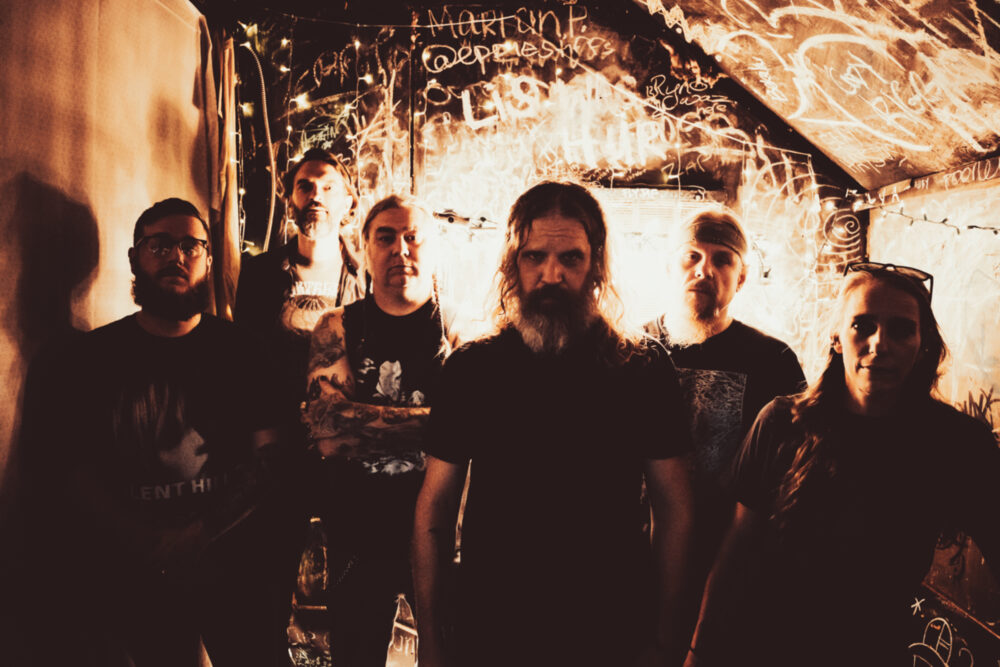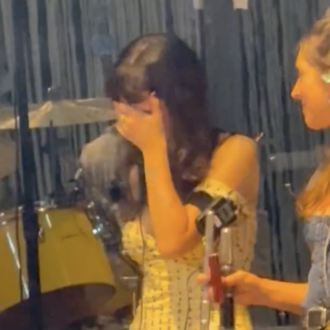The Magikal Return Of Rwake

Brett Cole
In the first decade of the 21st century, when there was a lot of weight being thrown behind the burgeoning “southern sludge” movement, Little Rock’s Rwake (pronounced “wake”) tore off an all-time run of kaleidoscopic, progressive doom metal albums. They were sometimes lumped in with the Savannah circle of bands – Baroness, Kylesa, Black Tusk – but their freewheeling, cosmic sound always felt a little wilder than what their Georgian contemporaries were doing at the time. Rwake’s sophomore album, 2002’s Hell Is A Door To The Sun, was their first masterpiece, an unhinged blend of proggy songcraft, psychedelic exploration, harrowing backwoods atmospherics, and good ol’ southern choogle. Songs like the furious “Unleashing Cosmic Destruction” and the meandering “The Stoner Tree” showcased the band’s awesome range, and the double-headed demon of co-vocalists Chris “CT” Terry and Brittany Fugate served as a breath of fresh air in a scene where workmanlike, monosyllabic grunts were the norm.
In 2004, the same year Mastodon released Leviathan, Rwake returned with If You Walk Before You Crawl You Crawl Before You Die. That album finds the band venturing even further off the beaten path. Its songs feel diseased, somehow — mired in darkness and choked out by briar thorns and hissing ambient noise. 2007’s Voices Of Omens was at least a partial reemergence into the light, and it remains Rwake’s most successful marriage of songs and production. The band’s clarity of purpose meshed perfectly with the clarity of sound captured by engineer Sanford Parker. The lineup of CT, Fugate on vocals and keys, drummer and primary songwriter Jeff Morgan, guitarists Kris “Gravy” Graves and Kiffin Rogers, and bassist Reid Raley also seemed to be working in more perfect lockstep, having all returned from the If You Walk album. Voices Of Omens still feels like a miracle to me. It’s one of my favorite albums of the 2000s.
Voices Of Omens was also the first album I ever listened to on a pair of high-quality headphones. I remember coming home from FYE – they were in malls, look it up – with the CD and my first pair of Sennheisers. I spent weeks peeling back the seemingly infinite layers of musical information the band had managed to embed in songs like “The Finality” and “Leviticus.” For months, my message-board signature – it was a little line of text under your posts, look it up – was a lyric from “Crooked Rivers” that I loved: “Fused in liquid lead with no crosses for the dead.” Like Rwake themselves, that line struck me as concrete but elusive, cryptic yet seeming to contain the universe. Four years later, in 2011, Rwake would release Rest, a behemoth of an album anchored by a few of the longest songs they’d ever written. It would be their last album for 14 years.
“Most of us are all-or-nothing people, and so we felt like it was unfair – not just to the music, but to [the band] in general – if we couldn’t fully, 100% devote ourselves to what we were doing,” Fugate says of the long layoff. “We just personally didn’t have the time in our lives to devote to what the music needed, and so, being all-or-nothing people, we ended up with a lot of nothing.”
“We just took our time to really focus on our families and our kids,” Morgan adds. “We just nested up. And we continued playing music in other projects, and we dabbled with the Rwake stuff, as well, during that time. But we really just took some time, because we toured heavy, and we made this our lives for a long time.”
Morgan is right to note that Rwake never actually broke up. During the 14 years between Rest and their new album, The Return Of Magik, the band played a few dozen shows, mostly in Arkansas. Morgan and CT also kept their collaborative fire burning, playing together in the black metal project Ash Of Cedars and the doom band Deadbird. Nobody in Rwake ever used the word “hiatus” — the band just wasn’t actively working on new music. For Morgan, the faucet never totally turned off. The oldest material on The Return Of Magik dates to a series of demos he made in 2018.
“I started receiving transmissions,” Morgan explains. “I started just hearing this music, and I was racing to the guitar and the microphone, trying to record it and capture it. Even if it was like voice memos on my phone, I was just trying to capture this music that was clearly Rwake, that was just showing up in my head. And in 2018, we hadn’t been doing anything in a while, so I was a little puzzled as to what was happening, and what could be done with it. Since we weren’t very active, we weren’t communicating as much. We kind of sent it back and forth, and everyone was in agreement, like, ‘This is clearly Rwake stuff.’ We weren’t synchronized enough at that time to get in the room. But then, when COVID happened, that’s when the endless band thread started.”
The Rwake that appears on The Return Of Magik looks a little different than the one that went quiet after the release of Rest. Gravy and Rogers declined to return, leaving the band without any guitarists going into rehearsals. Former touring bassist (and childhood friend) John Judkins stepped up in their stead, as did Morgan’s former guitar-store coworker and Cynic superfan Austin Sublett. Rwake functions as an egalitarian collective. Morgan brings in the initial skeletons, but they don’t become Rwake songs until everyone has their fingers on them. Judkins, who plays lap and pedal steel on the record, and Sublett, who shreds its tastiest leads, were immediately welcomed into that process.
“We’re really fortunate that we have a lot of trust in each other,” Fugate says. “When someone else brings something to the table, we trust them, to give them that room to breathe and to do that. That’s an important part.”
“All of the development that we did for this new record, I think, is what makes it so spiritual sounding,” Morgan concurs. “It’s such a ceremony. It really just takes you away, and you don’t know what’s happening. It’s a trance. And I feel like most of that is from how we were able to develop it.”
Rwake recorded The Return Of Magik with their longtime producer Sanford Parker at East End Sound in Hensley, Arkansas (pop. 139), about 20 minutes outside of Little Rock. The studio itself may have also contributed to the spiritual – or, more accurately, haunted – qualities of the record that Morgan alludes to. He says that East End was “discovered, almost archaeologically,” decades after it was originally built by the famous pedal steel player Zane Beck. If an abandoned recording studio in the Arkansas woods sounds like something you might encounter in a Rwake song, you’re not far off.
“[Beck] was from Arkansas, and he built his dream studio [in Hensley] in 1984,” Morgan explains. “It was built. It was ready to go. He had 2-inch tape machine in there. It was this amazing studio, and then he passed away a year later, in 1985. And so the place just sat. They had an engineer that would do sessions there throughout the ’80s, and [Beck’s] wife lived on the property. The drainage is weird, and so it just completely flooded the studio, and they just sealed it up. And it became this Last Of Us, black mold-looking building. A guy that we know, he met the person who bought the property after the flood, and the guy was like, ‘Hey, I think there’s a studio or something in the back of this property I bought. Do you want to come check it out?’ And so they opened it up, and they found this amazing museum-like setting. It was all gross from being locked up, but they were able to pull the floors out, redo the floors. They completely built it. I’ve been in there digging, too, and we were finding pictures of ZZ Top, and all this crazy history. To do it there was really special, in a creepy, weird, old, haunted studio in the middle of Arkansas.”
Even after a 14-year layoff, and with two new members to integrate, Morgan and Fugate say the recording of The Return Of Magik felt easy and intuitive. They were doing it close to home, with a trusted producer, and two-thirds of the band have been playing together for 25 years. The music, taken from Morgan’s initial demos from 2018 as well as a second batch of songs he wrote in 2021, was rehearsed and ready when they entered the studio. The only real complication came when they were trying to pin down the notoriously eccentric Black Oak Arkansas frontman Jim “Dandy” Mangrum, whose William S. Burroughs-esque spoken word part at the beginning of “Distant Constellations and the Psychedelic Incarceration” gives the record one of its most striking moments. Its origin story is more than worthy of the legend of Jim Dandy.
“Years ago, CT was helping film a Black Oak Arkansas documentary,” Morgan says. “Him and some friends were working with the camera crews and stuff. We’d known each other before that, and we’d run into each other here and there, and we formed a friendly relationship with Jim and the other members of Black Oak at that time. But when CT started working on that documentary, him and Jim got really close. And so Jim actually wrote this poem and gave it specifically to CT, and was like, ‘This is for you. It’s called ‘Psychedelic Incarceration.’ So CT told us, ‘Hey, Jim wrote this poem for me, and we need to record him saying it.’ Because anyone who knows anything about Jim Dandy knows that when he speaks, it’s like, the rock n’ roll preacher is at the podium, and everyone has to witness what’s happening.”
That poem existed long before there was a Rwake song to absorb it. Dandy wrote it in 2013, but without any imminent recording plans for the band, CT and Morgan put it on the back burner and almost forgot about it. But when Morgan eventually started receiving the cosmic transmissions that would become The Return Of Magik demos, he started hearing Dandy’s voice in his head.
“As soon as that song came, I could hear Jim’s voice on there,” he says. “On the demo version, I could just hear it. I was like, ‘We’ve got to get this poem from Jim.’ So when we were in the studio, we were calling him and leaving messages, like, ‘Please, Jim, let us come over!'”
Rwake didn’t hear back from Dandy while they were at East End. The recording sessions wrapped, everybody went home, and they almost moved on from the idea of having him on the record. Weeks later, when the band was deep into the mixing process, well — Jim Dandy to the rescue.
“CT sent a text that was like, ‘Jim’s house. Saturday,'” Morgan recalls. “So we loaded up, we went to his house, took a bunch of gear, miked him up, and we just hung out with him all day. I think we were there for, like, six or seven or eight hours. Who knows? Time doesn’t exist when you’re in Jim Dandy’s house. He just told us the most amazing stories about John Lennon, and it was unbelievable what a day it was. And we ended up getting the poem recorded.”
Dandy’s poem is just one highlight among many on The Return Of Magik, a comeback album that’s, improbably, well worth the 14-year wait. “You Swore We’d Always Be Together” is a mutant power ballad, reintroducing the band after their long nap with volleys of warped acoustic guitar and gut-wrenching emotional tumult. The title track and “With Stardust Flowers” emphasize the ritualistic, sacred qualities at the album’s core, with CT in full-on bug-eyed country preacher mode for most of their marathon runtimes. “Distant Constellations And The Psychedelic Incarceration” follows Dandy’s acid-casualty poem with a slow-build crescendo that resolves in a bout of twisty, tech-y riffage. Even “Φ,” a sub-two-minute studio improv piece for guitar and piano, seems to hum with the frisson of the band’s renewed collaboration. Fugate says it’s her favorite part of the record.
“When you take a step back, and you take a break like that, you realize what’s really important to you,” she says. “And I think we all realized that playing music together as a band was really important for all of us. We decided that we were going to make time in our lives to dedicate to working on Rwake stuff again as a unit, all together.”
TEN NAILS THROUGH THE NECK
Ingrown – "Hellbound" (Feat. Ross Dolan)
Location: Boise, ID
Subgenre: metallic hardcore
I don’t mean to step on Tom’s toes here; Ingrown is categorically a hardcore band, and their song “Bullet” showed up in last month’s edition of Let The Roundup Begin. But Ross Dolan from Immolation lends his angel-defiling roar to “Hellbound,” and that means it’s very much within my jurisdiction. Death metal and hardcore have been swapping spit since the ’90s, but there’s been an uptick over the past several years in bands who play fast and loose with the line between the two genres. Those bands typically lean hard on the chugging, mosh-heavy side of death metal, though—not the darker, more dissonant fare pioneered by Immolation. You won’t mistake the punishing “Hellbound” for an Immolation song, but Dolan’s presence does seem to be pushing Ingrown to the edge of their comfort zone, and it feels revelatory to hear his inimitable growl raining fire over something so straightforwardly brutal. It’s good enough to warrant a charitable program connecting hardcore kids with used copies of Dawn Of Possession. [From Idaho, out now via Closed Casket Activities.]
Rothadás – "Vértükör"
Location: Szeged, Hungary
Subgenre: death/doom metal
Tibor Hanyi and Lambert Lédeczy, the guys behind the hellish death/doom duo Rothadás, make up a sizable chunk of the Hungarian extreme metal underground all on their own. In addition to Rothadás, one or both of them play in Coffinborn, Cryptworm, Gravecrusher, Ahriman, Mörbid Carnage, and the impeccably named Tyrant Goatgaldrakona. Armed with a stunning sophomore LP in Töviskert… a kísértés örök érzete… lidércharang, it’s Rothadás who seem most primed for an international breakthrough. Album highlight “Vértükör” (“blood mirror”) channels the oppressively heavy, evil-sounding atmosphere of their Finnish forebears Rippikoulu and Demigod. Within all that suffocating darkness they summon, shards of malignant melody sparkle like blood diamonds. [From Töviskert… a kísértés örök érzete… lidércharang, out now via Me Saco Un Ojo Records.]
Ambergaze – "Scions Of Teal Plumage"
Location: Tijuana, Mexico
Subgenre: post-black metal
If you’ve got room in your heart for one more band making gorgeous, aching, shoegaze-adjacent black metal, consider Tijuana’s Ambergaze. I wasn’t hip to them yet when their debut album, Dawn’s Void & The Duskborn, came out in 2023, but their contribution to the four-way split Four Sorrows sent me scrambling to catch up. “Scions Of Teal Plumage” burns slowly but with dogged intent. Its ebbs, flows, peaks, and valleys feel meticulously mapped out for maximum emotional impact, and the luxurious mix gives every instrument plenty of room to breathe. (The first lead melody on the song is a bass line, which almost never happens in black metal.) The wordless clean vocal passages from mainman Mgrondant bear a striking resemblance to Neige’s coos on Souvenirs d’un Autre Monde, and his guitar work splits the difference between Kerry McCoy’s playing on Sunbather and Aaron Turner’s on Oceanic. This isn’t wheel-reinventing stuff, but it absolutely nails a sound that Ambergaze so clearly loves. [From the Four Sorrows split with Starer, Myrvandrer, and Mistral, out now via Fiadh Productions.]
Corpus Offal – "Corpus Offal"
Location: Austin, TX
Subgenre: death metal
One of the best things that death metal can be is gross. Corpus Offal is fucking disgusting. The Austin band’s self-titled debut album (and its trifecta-completing title track) worships the low, gurgling vocals and off-kilter lurch of Demilich, the doom-as-played-by-punks rumble of Autopsy, and the nose-thumbing feculence of pre-Necroticism Carcass. Their gutter inclinations belie a level of musicianship that doesn’t usually earn top billing on these kinds of records. Corpus Offal isn’t a tech-death band by any means, but “Corpus Offal” is fastidiously assembled and executed with confidence by a group of dudes – including half of Cerebral Rot and Bell Witch drummer Jesse Shreibman – who know what the hell they’re doing with their instruments. Still, the vibes reign supreme, and the vibes here are profoundly malodorous. [From Corpus Offal, out now via 20 Buck Spin.]
Ainsoph – "Purple Curtains"
Location: Amsterdam, Netherlands
Subgenre: raw black metal/post-punk
Ainsoph originally conceived Affection & Vengeance as a pair of EPs before ultimately deciding to present them as a single volume. That decision paid dividends. The full album presents a more complete picture of the Dutch band’s considerable ambitions, and it emphasizes the contrast between their lightest and darkest moments. Throughout Affection & Vengeance, Ainsoph ping-pong back and forth between bouncy, goth-y post-punk and black metal — albeit a black metal buoyed by diaphanous clean vocals rather than mired in indecipherable shrieks. Situated at the end of the album, “Purple Curtains” feels like a culmination, its raw, clipping blast beats roiling under rich, swirling guitar melodies and frontwoman I.V.’s chantlike verses. [From Affection & Vengeance, out now via Wolves Of Hades.]
Seven Sisters – "Andromeda Descending (A Fallen Star Rises)"
Location: London, UK
Subgenre: traditional heavy metal
There aren’t too many bands who can credibly pay homage to “Rime Of The Ancient Mariner,” the immortal 13-minute epic from Iron Maiden’s Powerslave album. Seven Sisters, hailing from Maiden’s hometown of London, do a pretty convincing job of it on “Andromeda Descending (A Fallen Star Rises).” As the closing track on the second volume of a two-part suite of concept albums, it’s a load-bearing song, one with the ability to make or break Shadow Of A Fallen Star’s musical narrative. The band doesn’t shy away from that challenge. “Andromeda Descending” is 20 goddamn minutes long, and it earns every second of its runtime. Riding waves of infectious twin guitar harmonies, Steve Harris-like lead bass parts, and the most confident vocal performance of frontman Kyle McNeill’s career, the band fluidly navigate the song’s seemingly endless procession of movements. There’s even a quiet section reminiscent of the “one after one, by the star-dogged moon” break in “Rime of the Ancient Mariner,” and just like on “Rime,” that bit precedes a soaring major-key eruption that ferries the song to the finish line. It’s powerful, heartening stuff. [From Shadow Of A Fallen Star Pt. 2, out now via the band.]
Crestworm Manipulator – "Gored By Homunculi"
Location: San Jose, CA / Rochester, NY
Subgenre: brutal death metal
Hey, who up manipulating they crestworm? I bestowed Band To Watch honors on both Undeath and Ripped To Shreds back in 2022, so my hype level was through the roof when I saw that their respective frontmen, Alexander Sason and Andrew Lee, had a new band together. Crestworm Manipulator is a much lower-stakes affair than either dude’s main project, but they’re both too good at what they do for it to feel half-assed. Inspired by the mechanized brutal death metal of obscurities like Inveracity and Guttural Secrete, and with lyrics that I absolutely do not understand based on the visual novels of writer Kinoko Nasu, Thaumaturgical Fortress Of Cruelty is some of the nerdiest shit I’ve heard all year. It’s also some of the most pulverizing. “Gored by Homunculi” feels, well, like being gored by homunculi. Shit’s sick. [From Thaumaturgical Fortress Of Cruelty, out now via Maggot Stomp.]
Teitanblood – "Tomb Corpse Haruspex"
Location: Madrid, Spain
Subgenre: raw black/death metal
For just the fourth time since the band’s formation in 2003, there’s a new Teitanblood album, and the Spanish black/death dealers haven’t lost a step. From The Visceral Abyss is every bit as blasphemous as their modern classics Seven Chalices and Death, even as it finds the band moving toward a slightly more musical expression of their malevolent impulses. Teitanblood have always been a cut above most of the stuff that gets lumped into the specious “war metal” tag, but in recent years, they’ve refocused their efforts away from total sonic chaos and toward songwriting and performance. Fortunately, that hasn’t come at the expense of the evil atmosphere they’ve always prized. From The Visceral Abyss closer “Tomb Corpse Haruspex” might be the best song they’ve ever written, a 15-minute labyrinth of searing riffs, breakneck tempo shifts, and eerie, half-buried melodies. They’re getting dangerously close to perfecting their dark sorcery. [From From The Visceral Abyss, out now via Norma Evangelium Diaboli.]
Rwake – "With Stardust Flowers"
Location: Little Rock, AR
Subgenre: progressive/psychedelic doom metal
We’ve already covered this marvel of a new record at length, so I’m not going to belabor the point. But it is truly so good to have Rwake back. I feel the same way about The Return Of Magik that I did when I was obsessively relistening to Voices Of Omens back in high school. Rwake are still doing things that only Rwake can do. Hopefully they’ll keep doing those things for a long time to come. Those things are distilled most potently into the (relatively) short “With Stardust Flowers,” so if you’re a skeptic who’s only willing give one song a shot, make it that one. [From The Return Of Magik, out now via Relapse Records.]
Deafheaven – "Body Behavior"
Location: Los Angeles, CA
Subgenre: post-black metal
Michael Nelson wrote this website’s definitive take on Lonely People With Power, and I wrote the cover story on Deafheaven for the latest issue of Decibel. If you want the full-freight new Deafheaven experience, go read those pieces. I’m going to use this space to celebrate a song that feels destined to become a deep-cut favorite. “Body Behavior” emerges out of the brutally heavy coda of “Revelator” with what feels like a blink-and-you’ll-miss-it homage to Iron Maiden’s “Invaders” riff, which just as quickly gives way to a motorik pulse. According to Kerry McCoy, the whole song started as a Can-style krautrock workout, but Deafheaven being Deafheaven, the Darkthrone blasts soon showed up and pushed it elsewhere. A little of that kraut-y groove stuck around, though, and it lives within the song alongside the bursts of bright melody and the slicing black metal riffs. Like so much of Lonely People With Power, it feels like a song that Deafheaven could only have written now, with the boldest experiments of Ordinary Corrupt Human Love and Infinite Granite out of their systems and the fog of war cleared from the distant corners of their sonic map. If you think Deafheaven peaked on Sunbather or New Bermuda – or hell, if you don’t care about them at all, and resent reading about them here at all – I get it. If you’re up for an adventure, though, Lonely People With Power is the most confident the band has ever sounded in synthesizing their disparate influences. It’s a marvelous thing. [From Lonely People With Power, out now via Roadrunner Records.]



